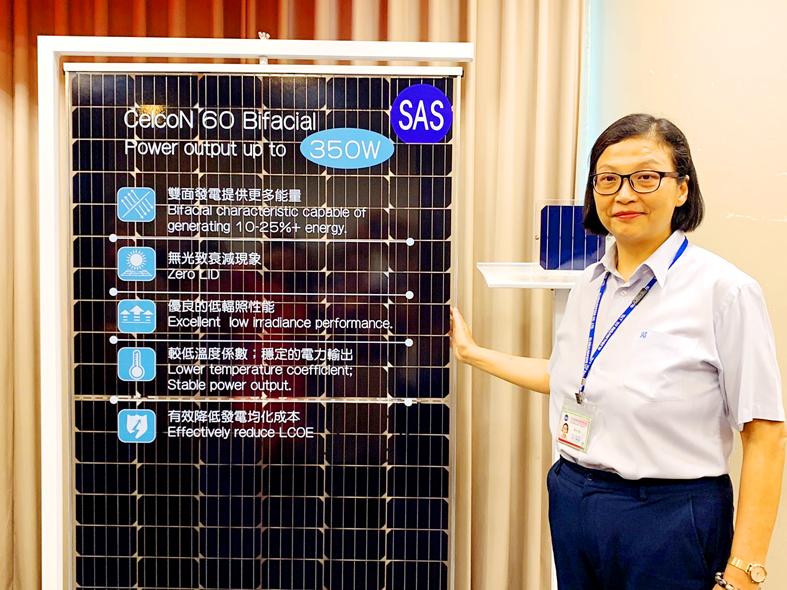Solar module maker Sino-American Silicon Products Inc (SAS, 中美矽晶) yesterday said net profit last year advanced to a historical high, benefiting from price increases and strong investment gains from its silicon wafer manufacturing subsidiaries.
The Hsinchu-based company provided a positive outlook in the expectation of strong demand for solar and renewable energy this year and next, as surging energy prices push countries to diversify energy sources, especially toward renewables.
Demand is also rising as nations set aggressive targets to cut carbon emissions or set “net-zero” timetables, SAS chairwoman Doris Hsu (徐秀蘭) said during a teleconference.

Photo: Chang Hui-wen, Taipei Times
“We see very strong growth starting this year, which will carry over through the next few years,” Hsu said.
Robust demand is also expected to bolster solar prices in the current quarter, extending from last year’s uptrend, Hsu said, adding that prices have been raised to reflect increases in the costs of raw materials, primarily polysilicone, transportation and energy costs.
Higher polysilicone and transportation costs drove down the company’s gross margin in solar products to 16 percent last quarter from 18 percent the previous quarter, the company said, adding that the rate is expected to remain flat this year.
To cope with high demand, SAS expanded solar cell capacity for the first time in about four years, with solar module capacity expansion occurring in Germany, it said.
Net profit last year expanded 0.8 percent to NT$6.82 billion (US$239.67 million), compared with NT$6.33 billion in 2020. Earnings per share rose to NT$11.62, from NT$10.82 the previous year.
Revenue jumped 12.1 percent annually to NT$68.84 billion last year, the best performance since 2018, when revenue hit an all-time high at NT$69.24 billion. About 89 percent of SAS’s revenue last year came from its semiconductor subsidiaries, mainly silicon wafer maker GlobalWafers Co (環球晶圓), 51.17 percent owned by SAS.
Gross margin climbed to an all-time high of 35.6 percent, from 34.4 percent in 2020.
“SAS achieved a positive in gross margin, operating income and cash availability in 2021. Without GlobalWafers, SAS would still be a growing and profitable company,” Hsu said when asked about investors’ concerns about the solar company’s financial performance.
Separately, SAS said that limited effects on its semiconductor operations in Japan were reported after a strong earthquake rocked northern areas of the country on Wednesday night.
“We lost several hours of work time, but operations were fully restored by noon yesterday, except silicon ingot growing,” Hsu said.
GlobalWafers operates five factories in Japan.
It has halted its ingot growing equipment for examination, Hsu said.

In Italy’s storied gold-making hubs, jewelers are reworking their designs to trim gold content as they race to blunt the effect of record prices and appeal to shoppers watching their budgets. Gold prices hit a record high on Thursday, surging near US$5,600 an ounce, more than double a year ago as geopolitical concerns and jitters over trade pushed investors toward the safe-haven asset. The rally is putting undue pressure on small artisans as they face mounting demands from customers, including international brands, to produce cheaper items, from signature pieces to wedding rings, according to interviews with four independent jewelers in Italy’s main

Macronix International Co (旺宏), the world’s biggest NOR flash memory supplier, yesterday said it would spend NT$22 billion (US$699.1 million) on capacity expansion this year to increase its production of mid-to-low-density memory chips as the world’s major memorychip suppliers are phasing out the market. The company said its planned capital expenditures are about 11 times higher than the NT$1.8 billion it spent on new facilities and equipment last year. A majority of this year’s outlay would be allocated to step up capacity of multi-level cell (MLC) NAND flash memory chips, which are used in embedded multimedia cards (eMMC), a managed

In the wake of strong global demand for AI applications, Taiwan’s export-oriented economy accelerated with the composite index of economic indicators flashing the first “red” light in December for one year, indicating the economy is in booming mode, the National Development Council (NDC) said yesterday. Moreover, the index of leading indicators, which gauges the potential state of the economy over the next six months, also moved higher in December amid growing optimism over the outlook, the NDC said. In December, the index of economic indicators rose one point from a month earlier to 38, at the lower end of the “red” light.

The global server market is expected to grow 12.8 percent annually this year, with artificial intelligence (AI) servers projected to account for 16.5 percent, driven by continued investment in AI infrastructure by major cloud service providers (CSPs), market researcher TrendForce Corp (集邦科技) said yesterday. Global AI server shipments this year are expected to increase 28 percent year-on-year to more than 2.7 million units, driven by sustained demand from CSPs and government sovereign cloud projects, TrendForce analyst Frank Kung (龔明德) told the Taipei Times. Demand for GPU-based AI servers, including Nvidia Corp’s GB and Vera Rubin rack systems, is expected to remain high,